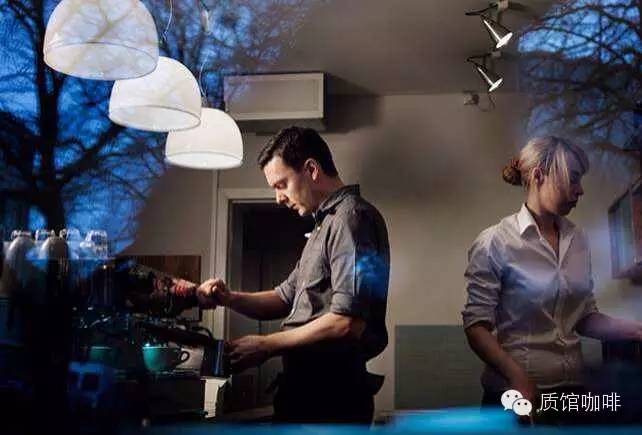The development trend of baristas
In recent years, the development trend of boutique coffee has several obvious characteristics, the most important of which is that coffee shop owners pay more and more attention to the quality of coffee, the choice of equipment, and are fully aware of the importance of good baristas to coffee shops.
The style of the boutique coffee shop is usually similar, according to the Melbourne aesthetic design style, it is a blend of industrial, retro and environmental elements, with La Marzocco, Synesso, Slayer or similar coffee-making equipment, baristas who specialize in making coffee and give it emotional color, and of course, the most important thing is fine coffee.
Nowadays, most coffee shop owners have their own machines and equipment, so the relationship between coffee shops and coffee roasting suppliers is not as close as before. The original business model is that coffee roasters provide coffee makers or roasting equipment for coffee shops. Coffee shops and roasters sign long-term supply contracts for coffee beans. Today, the maintenance of the long-term relationship between coffee shops and roasters depends more on the quality of coffee beans provided by roasters, equipment maintenance services and technical training for baristas.
Generally speaking, top coffee shops serve more than one kind of coffee, so different specifications of coffee grinders are needed to provide customers with individual or blended coffee. Moreover, it has gradually become a trend that coffee shops offer coffee from different roasters at the same time.
Espresso is still the king of coffee, but slowly, we see more mild coffee-making methods coming into the eyes of consumers, some of whom demand both espresso and filtered coffee. The popularity of filtered coffee is driven by professional baristas.
The role of coffee brands is becoming less and less obvious, especially in boutique coffee shops, the sense of existence of the brand is very weak, consumers no longer trust the brand blindly, and coffee shop owners also begin to promote their own coffee. some boutique coffee shops no longer use umbrellas, refrigerators, drinks and so on.
A major shift in the coffee shop catering industry is that consumers' trust in the brand is based on the coffee shop's own services. Fortunately, for boutique coffee, high-quality boutique coffee is a win-win for coffee roasters and coffee shop owners. High-quality coffee beans are considered to be the key to driving sales, providing a powerful platform to drive food sales and attract customers to visit every day or even spend more than one day.
The role of baristas is now clearly recognized as a key to the success of the coffee business. Gone are the days when anyone ran to the coffee machine and casually made a cup of coffee. Baristas have risen to the level of professionals, and a good barista is definitely worth it.
Baristas now know much more about coffee than they used to. In the past, baristas who knew how to foam properly were good enough, but now the requirements for baristas are to understand how coffee will change throughout the service, to adjust the degree of grinding of coffee, the right time to add milk, and so on. Today's coffee should understand the aging process of coffee, different roasting characteristics, and the effect of beans from different coffee producing areas and different producing areas in different blends. In fact, top baristas are using their own knowledge to constantly discuss with coffee roasters to promote coffee roasters to produce good products of uniform quality.
In the past few years, the career path of professional baristas has also been greatly expanded compared with the tradition of striving to be a coffee shop owner. Today, we see more professional baristas entering training in coffee roasting, chain stores, restaurants or other areas of the food industry. With the popularity of the coffee industry, many new roles have emerged: sales, company management, quality control, cup testing, raw bean management. In the future, the professional aspects of coffee catering will be more subdivided.
With the development of the industry, opportunities will be everywhere, this is a golden age to become a barista.

Important Notice :
前街咖啡 FrontStreet Coffee has moved to new addredd:
FrontStreet Coffee Address: 315,Donghua East Road,GuangZhou
Tel:020 38364473
- Prev

New Fair Trade Relation Coffees (Relational Coffee)
The new type of fair trade-building connections and credibility among peers is the new type of fair trade, which we also call Relation Coffees (relationship coffee). When the price of coffee is very low, fair trade is a very feasible solution. Today, however, this is no longer the case. Fair trade has become a common form of high-quality specialty coffee trade.
- Next

2016 EIC Italian Coffee China Guangzhou Division Championship Competition successfully concluded
The Guangzhou Division, the first leg of the 2016EIC Italian Coffee Championship in China, ended yesterday. The top three contestants will represent the Guangzhou Division to enter the 2016EIC China Finals, vying for the only valuable place in the world finals. A total of 15 contestants from Guangzhou Division took part in the competition. after a day of fierce competition, the top three were Chen Mingrui, Feng Jiarong and Zhong Biao Qiang.
Related
- What is the difference between Indonesian Sumatra Mantinin coffee and gold Mantinin? How to distinguish between real and fake golden Mantelin coffee?
- What does bypass mean in coffee? Why can hand-brewed coffee and water make it better?
- Unexpected! Ruixing Telunsu lattes use a smoothie machine to foam milk?!
- % Arabia's first store in Henan opens into the village?! Netizen: Thought it was P's
- Does an authentic standard mocha coffee recipe use chocolate sauce or powder? Mocha Latte/Dirty Coffee/Salty Mocha Coffee Recipe Share!
- What is the difference between Vietnam egg coffee and Norway egg coffee? Hand-brewed single product coffee filter paper filter cloth filter flat solution!
- What is the difference between sun-cured and honey-treated coffee? What are the differences in the flavor characteristics of sun-honey coffee?
- How to make Italian latte! How much milk does a standard latte use/what should the ratio of coffee to milk be?
- How to make butter American/butter latte/butter Dirty coffee? Is hand-brewed coffee good with butter?
- Is Dirty the cold version of Australian White? What is the difference between dirty coffee/decent coffee and Australian white espresso?

